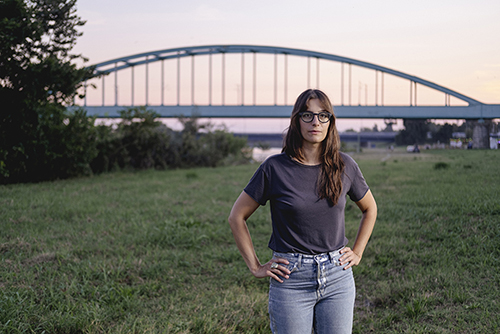This interview was organised by Centre for Peace Studies for the third edition of the “Portraits of Strength” photo exhibition. The photo was taken by Sanja Merćep, at Savski Nasip, Zagreb, Croatia, in August 2024.
Why did you become a human rights defender?
I never set out to become a human rights defender intentionally, it was more a natural progression.
“From a young age, I had a strong sense of justice, but it was the lived experience of a family friend, a survivor of the Jasenovac concentration camp during WWII, that had the most profound impact on me. In my early teens, I delved deeply into refugee issues, realising immediately that this was the area I wanted to work in as an adult.”
”One thing led to another, and while I never initially saw myself as a human rights defender, it became clear as others began to label me as such, and I started to feel the personal weight and responsibility of the role.”
What is the nature of your work and what challenges do you face as a Woman Human Rights Defender?
“My work focuses on protecting the human rights of refugees and other migrants, primarily related to pushbacks and other human rights violations, through advocacy, strategic litigation, direct assistance, research, and education. In today’s political climate, defending these rights has become increasingly challenging. The scope of our work is continually shrinking due to the erosion of asylum and migration laws and the criminalisation of migration itself. Moreover, human rights defenders have become targets of authorities, politicians, and individuals harbouring anti-migrant sentiments.”
As a woman human rights defender, I face additional challenges. I am frequently taken aback by the patriarchal attitudes evident in the online comments directed towards women human defenders, especially threats or insults implying sexual violence.
What is the current human rights situation in your country?
Croatia faces significant human rights challenges. The rule of law and judicial independence are weakened by slow processes, political influence, and a lack of transparency despite ongoing reforms.
“Media freedom, while present, is under threat from concentrated ownership and risks to journalist safety, particularly for those reporting on corruption or organised crime. Ethnic minorities, particularly Serbs and Roma, as well as newer immigrant communities, face systemic obstacles and discrimination. LGBTQ+ rights have seen progress, yet societal stigma and hate speech remain issues. Gender-based violence is a persistent problem. Although civil society is active, it contends with funding and bureaucratic obstacles, necessitating vigilance to protect civic space.”
What kind of human rights situation in your country would you like to see in the next 30 years?
“In 30 years, I hope to see Croatia making genuine progress rather than regressing. I envision a society where everyone has equal opportunities and rights, irrespective of socioeconomic status, ethnicity, religion, skin colour, gender, or sexual orientation. I wish for a political environment driven by the best interests of all residents and institutions that operate independently of particular political or economic interests.”
I aspire to a legal system focused on advancing human rights rather than undermining them, and a legal framework that prioritises protecting the most vulnerable members of our society.
Can you describe your motivation to be a human rights defender?
“I aspire to live in a society where solidarity and equality are shared values, believing that each small change we make today will eventually lead to a tipping point.”

About Portraits of Strength
Women human rights defenders (WHRDs) work to protect and advance freedoms while facing discrimination and stereotypes about their role and participation in society.
HRHF seeks to honour and promote independent women human rights defenders and their work through the “Portraits of Strength: Women Defending Human Rights” photo exhibition and highlight the human rights situation in the countries of the Network of Human Rights Houses.
The exhibition, now in its third edition, shares portraits and stories from WHRDs working on a variety of issues including the documentation of human rights violations and alleged war crimes, rule of law, women’s rights, political prisoners, freedom of expression, and more.
Find out more here.





